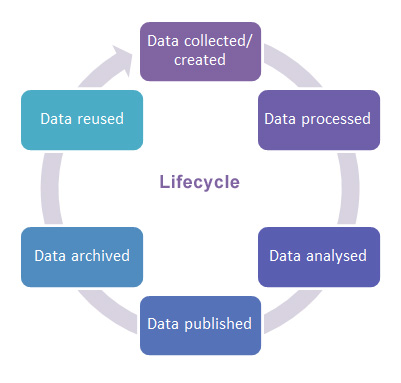Data management plans
 Creating a Data Management Plan (DMP) is an essential first step into research data management. You should plan to manage your research data through all stages of the research lifecycle (view an accessible description of the lifecycle).
Creating a Data Management Plan (DMP) is an essential first step into research data management. You should plan to manage your research data through all stages of the research lifecycle (view an accessible description of the lifecycle).
- Data collected/created
- Data processed
- Data analysed
- Data published
- Data archived
- Data reused
Benefits of a DMP
- It can help you! Good data management and planning can help you find and reuse your own data for future projects
- Continuity. A good DMP can be essential if staff change projects or institutions
- Avoids duplication of effort. Unnecessary reprocessing of data or duplicated observations can be avoided both within a project but also between projects if data can be easily understood and reused
- Getting credit. Planning ahead for the end of the project can help your research data, and thus your project, be more visible, accessible, citable and able to create impact
- Better collaborations. Data sharing leads to more collaboration between groups and helps advance research
- Easier sharing. Many funders and a growing number of journals now require you to share your data at the end of a project and alongside publications
- Meet funder’s requirements. Most funders now require a data management plan either at the application stage or once the funding is awarded. The Digital Curation Centre has created a quick guide to the data management plan requirements of the major UK research funders.
A DMP should cover
A basic data management plan will cover these basic areas:
- The research project and research context, including what data will be created by the research project and why
- Data types, formats, standards and capture methods
- Consent, data protection, copyright, intellectual property - including what actions are appropriate given the nature of the data and any restrictions that may need to be applied. Read the University statement on the Ethical Conduct of Research
- Short term storage and data management through the active project
- Deposit and long-term storage including preservation
- Access, data sharing and re-use including how and where data will be shared
- Resourcing - most funders now require a data management plan either at the application stage or once the funding is awarded.
- The Digital Curation Centre's guide to the data management plan requirements of the major UK research funders includes advice about costing data management into your project
- The UK Data Service has a guide and checklist for costing this area of your research
- Training and support – are there skills and training requirements in this area in your team? If so have you costed them into your project? Email: researchdata at warwick dot ac dot uk
Tools and templates
- DMPOnline a web based tool which walks you through the creation of a DMP (University login needed)
- The DCC also has a collection of example plans
- The UK Data Service has a tool to help with the costing of data management
Further help
Contact researchdata at warwick dot ac dot uk if you need further help and advice.
